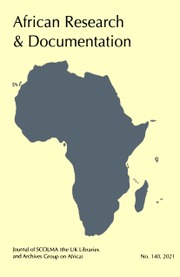No CrossRef data available.
Article contents
Bridging The Gap Between Ghanaian Elite And Popular Fictions: Ayi Kwei Armah's The Beautyful Ones Are Not Yet Born And The Episteme Of Post-Independence Popular Literature
Published online by Cambridge University Press: 25 April 2022
Extract
If the recent research in African popular culture has succeeded in dismissing the traditional “binary paradigm” (Barber 1997, p. 2) that keeps compartmentalising the continent's culture into two strands, the literate/elite vs. the oral/traditional, and in asserting the domain of the popular productions as a “third space” of creative production, little has been done so far to study a possible artistic continuity between the genre of the popular and the other two genres. Indeed, while the interplay between traditional verbal arts and the modern development in the novel is extensively investigated by scholars and critics alike, little has been done until now to explore the interactions between popular and elite fictions.
- Type
- Research Article
- Information
- Copyright
- Copyright © African Research & Documentation 2018
References
A correction has been issued for this article:
Linked content
Please note a has been issued for this article.




